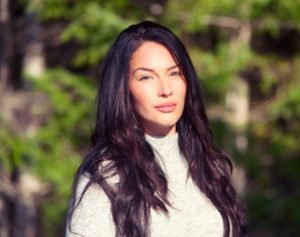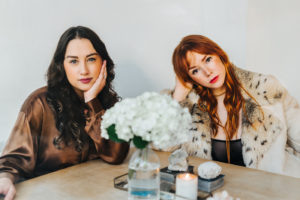Image from The Road Forward (Marie Clements/The NFB)
By Loose Lips Mag
@looselipsmag
As magazine runners in Gastown, we’re lucky to hold space for feminist-focused arts and culture on the unceded territory of the Musqueam, Squamish and Tsleil-Waututh First Nations.
Like we noted in our Letter From The Editors on White Supremacy, we acknowledge we are white women of privilege. We want to stand with those who are affected by the harms of colonialism. It can be tempting to put the onus on our government and the powers that be to apologize for historical wrongs and to fix current injustices, but the real work starts with the individual. As settlers on this land, especially as white settlers, we are being called on to do the hard, introspective work of decolonizing our thoughts and actions.
With the guidance of a workshop run by Carol Bilson, Siku Allooloo and Nikki Sanchez, a PhD Student in Indigenous Governance at UVIC, we rounded up 10 ways settlers can be better allies for Indigenous folks.
IDENTIFY THE TERRITORY YOU’RE IN & LEARN A GREETING IN THE LOCAL LANGUAGE
Land acknowledgements are a keystone act of recognizing that we’re occupying space on stolen land, but this has to be so much more than a token opening to any official meeting. Be conscious of the territory you’re occupying wherever you are, whether living, working, or travelling, as this will inform you of the traditional land use practices of the landscape and the protocols of the nations Indigenous to the land. Not sure how? Find out with this interactive map of Indigenous territories here and here. You can enact this in your every day by changing your email signature or social media bio to include a territory acknowledgement that recognizes whose territory you are occupying and what your relation is to it (ei. Settler, immigrant, guest).
Would you go abroad without learning a simple greeting in the language spoken there? Respect your own community enough to do the same. For example, Halkomelem is a Coast Salish language of British Columbia and Washington state, and a simple greeting in this language is ‘uy’ skweyul, meaning “good day.”
LISTEN TO INDIGENOUS VOICES
When it comes to media, representation matters. While the mainstream media most often depicts white stories and white bodies, you’ll have to make the conscious effort to add Indigenous voices to your media diet. Find podcasts by Indigenous creators, read articles written about Indigenous issues written by Indigenous journalists, check out emerging Indigenous music , playlists and upcoming concerts, watch films by and starring Indigenous peoples. For the most contemporary, relevant films, check out ImagiNATIVE here. If you love binge-watching TV, add some Indigenous stories to your current routine–such as VICE’s Rise series, for which Nikki was a cultural advisor, researcher and associate producer. Like and follow Indigenous creators on social media. Most importantly, and most overlooked, make an effort to talk to and connect with Indigenous people in your community. “I’ve seen girls walking down the street wearing Cowichan sweaters, but then ignore the Indigenous people living on the street,” says Sanchez. Don’t be that person.
SELF IDENTIFY
If the lands you are living on are not those of your ancestors, you are a guest in someone else’s homelands and should act respectively. While we find it problematic to probe our fellow Canadians for their cultural and ethnic heritage, when it comes to decolonizing, this is important self-education. “Know enough about who you are to know how you got here,” Sanchez imparts. This is the beginning of dismantling privilege and understanding your place in the colonial structure. A simple exercise to start unpacking is to take the time to find out the birthplace of your maternal and paternal grandmothers, and then their mothers, and so on. The erasure of pre-settlement lineages has been a very intentional aspect of forming the Canadian national identity, so for many these are difficult questions to find the answers to.
DON’T SUPPORT THE ERASURE OF HISTORY OR PROBLEMATIC REPRESENTATIONS OF THE PAST
The sooner we, as settlers, acknowledge this country was founded on veritable genocide and capitalism, the sooner we can start the healing process. Did you know Indigenous fur traders were paid in credit to the Hudson’s Bay Company, while white fur traders were paid with cash? Did you know the Indian Act is alive and well? Did you know that Indigenous groups were given blankets infected with smallpox, and then had treatment withheld from them while white settlers were given medical attention? Did you know they were starved out of their territories? And, as long as Industrial colonization continues to rob Indigenous communities of their land, the murderers of Colten Boushie and Tina Fontaine walk free – and more than 14,000 missing and murdered Indigenous women cases go unsolved – that genocide is not a thing of the past.
REASSESS YOUR ENTITLEMENT TO THE LAND YOU LIVE ON – WITHOUT GETTING DEFENSIVE
The “But I was born here” mentality only further enforces the effects of colonization. Who’s land are you on, and what are the protocols in that community? Just like you’d remove your hat at a legion or a classroom, respect the protocols of the space you’re occupying. One that developers conveniently forget is “Don’t dig up our ancestors.” You are not entitled to live on a sacred burial site, even if you were born 20 km away. Pretty simple, right?
PURCHASE FROM INDIGENOUS ARTISTS
Support Indigenous-backed businesses and local Indigenous creators. When we purchase goods, we vote with our dollar, and purchasing Indigenous-inspired goods from corporations and non-Indigenous people only cheapens their traditional art and craft. Many things that we purchase have purpose and meaning, and should be purchased or traded with someone who can educate you on how to use them – like dreamcatchers, weavings, and sage bundles. It’s nice to see Indigenous art and carvings showcased in local art galleries, but ask what percentage of the sale goes back to the creator. Note: sage bundles shouldn’t really be purchased at all, as medicines have a spirit and that spirit is desiccated when they are commodified.
Want to start now? Here are some great Indigenous owned businesses/artists to patronize:
https://www.sectionthirtyfive.com/
https://www.edzerzagallery.com/
https://cheekbonebeauty.ca/
https://www.quwutsunmade.com/
http://www.beyondbuckskin.com/
https://www.thentvs.com/
TAKE A DECOLONIZATION WORKSHOP OR ANTI-OPPRESSION TRAINING
- You can connect with Nikki Sanchez and her colleagues to set up a Decolonial 101 training at decolonial101@gmail.com
- Want to check in with Indigenous groups soon? Join Pipe Up Network for their Annual General Meeting and Ally Workshop on March 15, here: https://www.facebook.com/events/621262928226001/
- Book a Kairos Blanket Exercise for your school or place of work: https://www.kairosblanketexercise.org
ATTEND PROTESTS WITH A HUMBLE, HELPING SPIRIT
It’s important for settlers and white folks to use our privilege to speak up for the people who’s land we share, but don’t do it for the ‘gram. Get in touch with organizers ahead of time to see how you can help: offer transport to elders, bring sign-making supplies, bring blankets or hot chocolate or tea. Don’t stand in front of any First Nations people at a First Nations protest – this is first and foremost their story, and you are there for support.
You can stay in touch with further actions and ways to be a good ally with the Musqueam, Squamish and Tsleil-Waututh First Nations by texting the word “ready” to 52267.
FIND OUT WHY MARILYN POITRAS RESIGNED HER POSITION AS COMMISSIONER WITH THE MISSING AND MURDERED INDIGENOUS WOMEN AND GIRLS’ INQUIRY
Hint: It has a lot to do with the epidemic of sexual violence enacted on systemically marginalized people, and how the MMIWG Inquiry was not addressing its root causes.
DO SOME INDEPENDENT STUDY
Thomas King’s The Inconvenient Indian is a good place to start. For more accountability, register for the University of Alberta’s online Massive Open Online Course, called Indigenous Canada, for free.

Nikki Sanchez is a Pipil/Maya and Irish/Scottish academic, Indigenous media maker and environmental educator. Nikki holds a masters degree in Indigenous Governance and is presently completing a PhD with a research focus on Indigenous media, land based stewardship and cultural knowledge transmission. She is the current David Suzuki Foundation “Queen of Green” where her work is centered on digital media creation to provide sustainable solutions for a healthy planet, as well as content creation to bring more racial inclusivity into the environmental movement. Nikki has been involved with social justice and Indigenous rights work for over 15 years; themes which culminated in the premiere season of the VICELAND series “RISE” which focused on global Indigenous resurgence, on which she worked as the lead researcher, community liaison and carried out duties of assistant producer. RISE debuted at Sundance in February 2017 and has received global critical acclaim, recently winning the Canadian Screen Guild Award for Best Documentary series. For the past decade, Nikki has also worked as an Indigenous environmental educator, curriculum developer and program manager. She currently runs an independent consulting company which specializes in decolonial and equity training for businesses and institutions.

Kristi and Brittany are the co-founders and co-editors of Loose Lips Mag. Together, they’re building their feminist media empire—leaving the patriarchy, charcuterie boards and empty bottles of wine in their wake. Loose Lips Media is grateful to operate on the unceded Coast Salish territory of the Musqueam, Squamish and Tsleil-Waututh First Nations.




